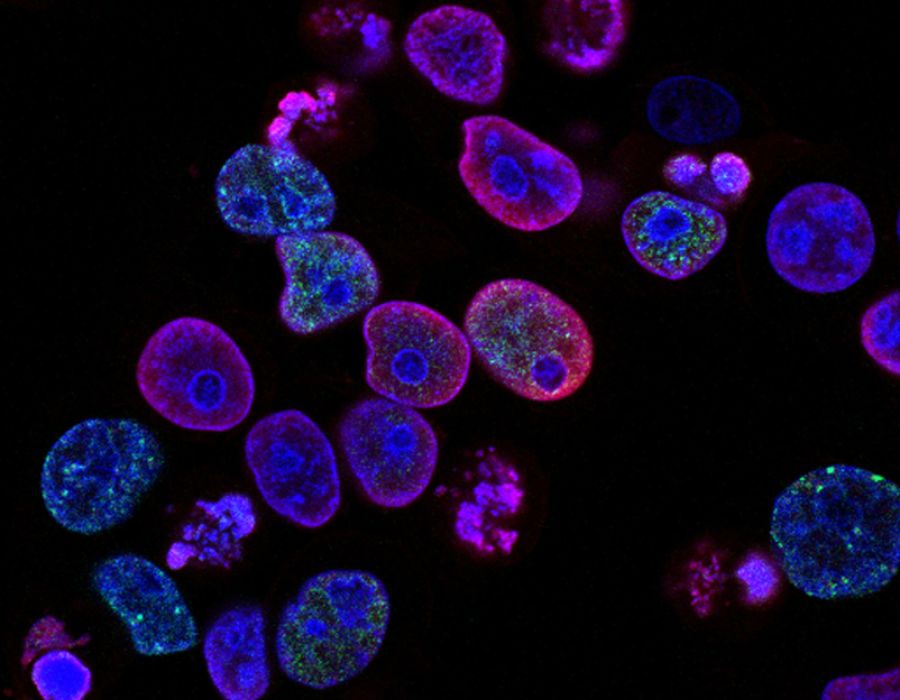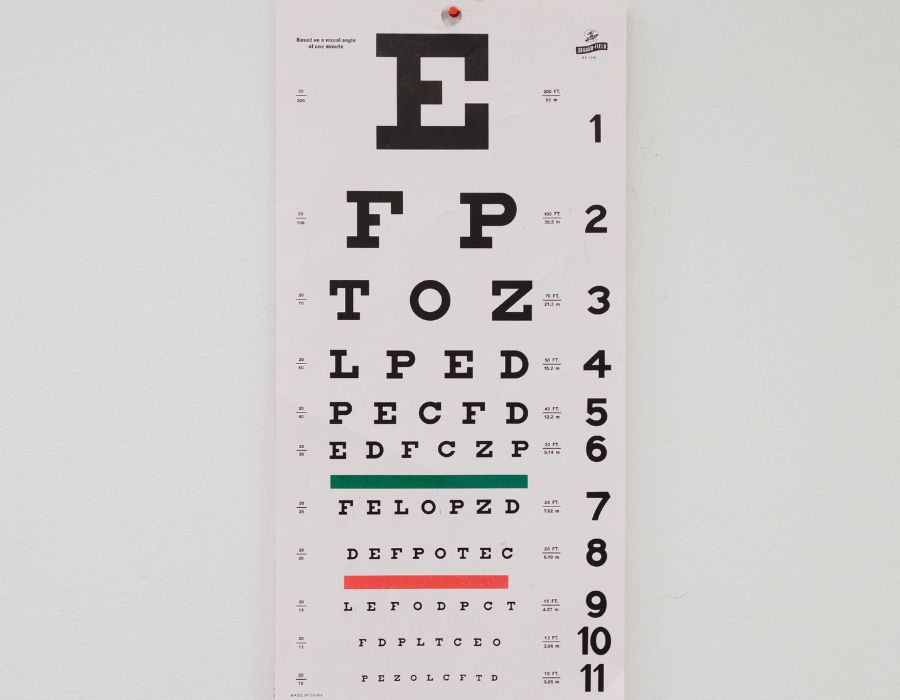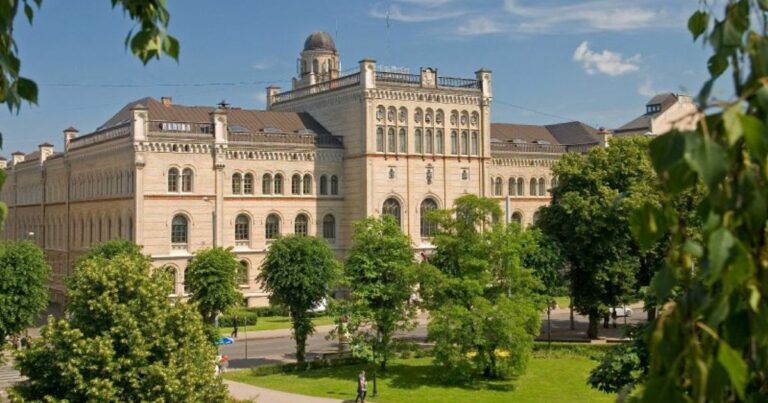Every year, students, professors and other university staff gather to work, learn and contribute to the future of the University of Latvia.
Every year, 15,000 people start their studies at the University of Latvia, and they are not just local students. There are also many students from other countries who have come to study here through the Erasmus programme.
Young people from all over the world start their studies in the seven branches of the University in Latvia: Aluksne, Bauska, Cesis, Jēkabpils, Kuldīga, Madona and Tukums. As in Riga, these locations offer different levels of study, but with fewer choices. Even though they study outside the capital, students also have to be aware that from time to time they will need to travel to Riga.
The University of Latvia offers 13 faculties, each with its own specializations. For example, the Faculty of Humanities offers 5 specializations, while the Faculty of Business, Management and Economics invites its students to study in 7 specializations.
Read on to find out a bit more about what you’ll learn while studying at the Faculty and about the job opportunities when you get your diploma.
Choose the faculty you are interested in here :
- Faculty of Biology ;
- Faculty of Business, Management and Economics ;
- Faculty of Computing ;
- Faculty of Physics, Mathematics and Optometry ;
- Faculty of Geography and Earth Sciences ;
- Faculty of Humanities ;
- Faculty of Medicine ;
- Faculty of Law ;
- Faculty of Chemistry ;
- Faculty of Education, Psychology and Arts ;
- Faculty of Social Sciences ;
- Faculty of Theology ;
- Faculty of History and Philosophy.
Faculty of Biology

Studies at the Faculty of Biology at the University of Latvia will help you understand the natural world and the diversity of life on Earth. Biology plays an important role in solving major global problems such as climate change, disease and food security.
Biology is a broad field that includes many sub-disciplines such as genetics, ecology, microbiology and biochemistry, making it a versatile subject that can offer many different career opportunities.
A degree in biology offers many different career options. Here are some of the options to consider:
- Research: Many biologists work in research, either in academia or industry. In this role, you’ll carry out experiments, analyze data and publish research papers to deepen our understanding of biological processes. This could include anything from studying the molecular basis of disease to studying the ecology of ecosystems.
- Environmental science: If you’re interested in environmental issues, you could work in environmental science. In this role, you would study the effects of pollution on the environment.
- Education: If you enjoy teaching and working with students, you could work in education. With a degree in biology, you could teach in high school or college, or even work in science outreach programmes to educate the public about biology and its applications.
- Biotechnology: With the development of biotechnology, there are many career opportunities for biologists in this field. In this role you could use your knowledge of biology to develop new medicines, vaccines or other products that improve human health.
Address of the Faculty of Biology : Kronvalda bulvāris 4, Centra rajons, Rīga, LV-1010
Faculty of Business, Management and Economics

Business
Business studies at the University of Latvia will help you develop skills in areas such as leadership, management and strategic planning. Gain knowledge that can be used in different industries and career fields. You will gain knowledge on how to effectively manage and develop a business or organisation that can be useful for any professional.
A degree in Business Studies opens up a wide range of career opportunities. Here are some options to consider:
- Finance: Many business graduates go on to work in finance – in investment banking, corporate finance or financial planning and analysis. In these roles, you will use your knowledge of finance to analyse financial statements, develop financial models and make investment decisions.
- Marketing: Marketing is another popular career path for business graduates. In this role, you will develop and implement marketing campaigns to promote products or services, conduct market research to better understand customer needs and wants, and analyse sales data to identify trends and opportunities.
- Management: with a degree in business, you can also pursue a career in management. This could involve leading teams of employees, overseeing the running of a business or developing and implementing strategic plans to achieve organisational goals.
- Entrepreneurship: Many business graduates choose to start their own businesses, using their knowledge of finance, marketing and management to develop successful businesses.
- Consulting: Finally, you could work as a consultant, providing advice and guidance to businesses and organisations in a variety of areas such as strategy, operations or finance.
Management
The University of Latvia will provide an understanding of management and leadership principles. Studying at the Faculty of Management can help people to become more effective in their personal and professional lives, build stronger relationships, and achieve their goals more effectively.
Management education can help people develop the essential skills needed to become a good manager. For example, communication, decision-making, problem-solving, change management, conflict resolution, emotional intelligence and visionary thinking.
With a degree in management, there are many different career paths you can explore. Here are some of the options to consider:
- Business Operations: Many graduates with a management degree go on to work in business operations. Overseeing the day-to-day running of a company or organisation. In this role, you’ll use your knowledge of management principles to lead employees, allocate resources and ensure that the company achieves its goals.
- Human resources: Human resources is another popular career path for management graduates. In this role, you would manage recruitment and selection, design and implement training programmes and ensure that the company complies with employment laws and regulations.
- Consultancy: With a management degree, you could also work as a consultant, providing advice and guidance to companies and organisations.
- Entrepreneurship: Many management graduates choose to start their own businesses, using their knowledge of management principles to develop successful businesses.
Economics
Understanding the economy can help people make better personal finance and investment decisions. Economics also plays an important role in shaping public policy, so studying economics can help people understand the impact of government decisions.
Economics is a social science and studying it can help to understand how society and the economy work. A degree in economics offers many different career opportunities. Here are some of the options to consider:
- Finance: Many economics graduates go on to work in finance – in investment banking, corporate finance or financial planning and analysis. In these roles, you will use your knowledge of economics to analyse financial statements and develop financial models.
- Government: Another popular career for economics graduates is public administration. In this role, you will work in a variety of areas such as policy development, regulatory compliance or economic analysis.
- Consultancy: With a degree in economics, you could also work as a consultant, providing advice and guidance to companies and organisations in a variety of areas such as strategy, operations or economics.
- Research: If you like research, you could work in academia or in a research institution. In this role, you could conduct research on economic topics, publish research papers and present your findings at conferences and seminars.
Address of the Faculty of Business, Management and Economics : Aspazijas Boulevard 5, Centra rajons, Rīga, LV-1050
Faculty of Computing

Studying computer science can provide a solid foundation for a wide range of careers. Including in technology, business and other sectors. It can also provide valuable skills such as coding, problem solving, critical thinking and data analysis. In addition, computer science is a fast-growing sector with a high demand for professionals.
Computer science is an interdisciplinary field, which means that it can be applied in many areas. It also plays an important role in shaping the future, so it is a field that is always evolving and challenging.
A degree from the Faculty of Computer Science at the University of Latvia opens up many different career opportunities. Here are some options to consider:
- Software development: One of the most common career paths for computer science graduates is software development. In this profession, you will design, develop and test software programs for various applications such as web applications, mobile apps or computer games.
- Data science: With a degree in computer science, you could also pursue a career in data science. In this role, you would use your expertise in programming and data analysis to extract information from large data sets. And then use this information to make business decisions or develop new products.
- Cyber security: Another area in which computer science graduates are increasingly being asked to work is cyber security. In this role, you will develop and implement security measures to protect computer systems and networks from cyber threats such as hacking and malware.
- Artificial intelligence and machine learning: Computer science graduates can also pursue careers in artificial intelligence . Also machine learning technologies, so computer science graduates can work in these areas. In this role, you could develop algorithms and models that allow machines to learn and make decisions. Also use these models in various applications such as autonomous vehicles, speech recognition and image analysis.
Address of the Faculty of Computer Science : Raiņa Boulevard 19, Central District, Riga, LV-1050
Faculty of Physics, Mathematics and Optometry

The University of Latvia offers young scientists the opportunity to start their studies at the Faculty of Physics, Mathematics and Optometry, located in the modern premises of the Academic Centre, Nature House and Science House of the University of Latvia.
Physics
Studying at the Faculty of Physics will contribute to your understanding of the fundamental laws of nature. Physics is used to explain everyday phenomena such as how a ball bounces, why the sky is blue and how electricity is generated.
Studying physics will give you an understanding of the development of technology. Physics is at the heart of many technologies, including computers, medical imaging and renewable energy.
Studying physics opens up a wide range of career opportunities, including research in academia, industry and government, as well as in areas such as finance, consultancy and teaching.
With a degree in physics, there are many different career paths you can pursue. Here are some of the options worth considering:
- Research: Many physics graduates go on to careers in research, either in academia or industry. In this role, you’ll carry out experiments, analyse data and publish research papers on topics as diverse as astrophysics, condensed matter physics or particle physics.
- Engineering: With a degree in physics, you could also work in engineering, either as a physicist or as an engineer. In this role, you could use your knowledge of physics to design and develop new technologies such as lasers, semiconductors or medical devices.
- Teaching: Physics graduates can also work as teachers in high school or college. In this role, you’ll teach students the principles of physics, run experiments and mentor students in research projects.
- Data science: Physics graduates with a strong background in mathematics and quantitative analysis are also well suited to a career in data science. In this role, you will use your knowledge of statistics and modelling. To analyse large data sets and then use these insights to make business decisions or develop new products.
- Finance: Some physics graduates go on to work in finance. Where their analytical and problem-solving skills can be a valuable asset. In this role you could work in areas such as quantitative analysis, risk management or financial engineering.
Mathematics
Mathematics is a language that is the same all over the world, which is why it is so beautiful. Mathematics can be a good choice for those who want to pursue a career in a math-related field, such as research, teaching or finance.
It can also be interesting for personal development and can help people develop critical thinking, analytical skills and creativity. Mathematics is a fundamental subject that is used in many other areas such as science, engineering, economics and computer science.
A degree in mathematics can prepare you for a wide range of careers. Here are some examples:
- Actuarial science: Mathematicians with good analytical and problem-solving skills can work as actuaries. In this role, you will use mathematical models to assess the financial risk of insurance and other financial products.
- Data science: Mathematicians with a strong background in statistics and quantitative analysis are well suited to a career in data science.
- Education. In this role, you’ll teach students the principles of mathematics, lead experiments and mentor students in research projects.
- Finance: Mathematicians can also work in finance, where their analytical and problem-solving skills can be a valuable asset. In this role you could work in areas such as quantitative analysis, risk management or financial engineering.
- Operations research: Operations research involves applying mathematical methods to solve complex problems in business, engineering and other fields. Mathematicians with good analytical skills can find careers in this field, working on the optimisation of systems and processes.
Optometry

Optometric training will never slow down, as it is a constantly evolving field. Optometric studies offer the opportunity to contribute to the advancement of medical knowledge and technology. Optometric studies can provide a rewarding career as people use their knowledge and skills to help others maintain good vision and eye health.
On completion, a degree in optometry offers a wide range of career opportunities, including practising optometry, working in research and development, and teaching.
With a degree in optometry, you will be trained as a healthcare professional specialising in vision and eye care. Here are some of the career opportunities available to optometry graduates:
- Optometrist: As an optometrist, you will be responsible for performing eye examinations, diagnosing vision problems. As well as eye diseases, prescribing glasses or contact lenses and providing other eye care services to patients.
- Vision scientist: Optometrists can also work in research, either in academia or industry. In this role, you could conduct experiments, analyse data and publish research papers on a variety of topics related to vision and eye care.
- Ophthalmic technician: Another career option for optometry graduates is to work as an ophthalmic technician. In this role, you will assist ophthalmologists and optometrists in performing eye examinations, collecting patient data and other clinical tasks.
- Optometry educator: graduates of optometry schools can also work as teachers, either in optometry school or college. In this role, you would teach students the principles of optometry, conduct clinical training and mentor students in research projects.
- Public health: Optometry graduates can also work in public health, where they can contribute to programmes aimed at preventing eye disease, improving access to eye care and raising public awareness of eye health.
Address of the Faculty of Physics, Mathematics and Optometry : Zelļu iela 8, Zemgales suburb, Rīga, LV-1002
Faculty of Geography and Earth Sciences

Earth Sciences
The University of Latvia will provide an understanding of the geological processes that shape the Earth, including plate tectonics, earthquakes, volcanoes and erosion. Earth Science plays a key role in addressing global challenges such as natural hazards, climate change and resource management.
The knowledge and skills acquired through the study of Earth Science can be applied in a wide range of professions and industries. Including energy and mineral exploration, environmental management, and disaster preparedness and response.
A degree in Earth Sciences can prepare you for a variety of careers in fields related to the study of the Earth and its systems. Here are some examples:
- Environmental science: With an Earth science degree, you can pursue a career in environmental science. In this role, you will be involved in environmental research, including the impact of human activities on Earth systems, as well as the development of conservation policies and strategies.
- Geology: Another career option for Earth Science graduates is to work in geology. In this role you would study the physical, chemical and geological properties of the Earth, including rocks, minerals and fossils. You could work in a variety of fields including mining, oil and gas exploration and environmental consultancy.
- Meteorology: If you’re interested in weather and climate, you could pursue a career in meteorology. In this role, you will use your knowledge of earth science to study weather, atmospheric conditions and climate change.
- Oceanography: Earth science graduates can also work in oceanography. In this field, you would study the physical, chemical and biological properties of the oceans, including ocean currents, marine life and the effects of climate change on the marine environment.
- Education: Earth science graduates can also work in education – as teachers at secondary or college level.
Geography
Geography also develops critical thinking, research and analytical skills, and provides a foundation for understanding the impact of natural and human processes on the Earth’s physical and cultural environment.
A degree in Geography can prepare you for a variety of careers in fields related to the study of human and physical geography. Here are some examples:
- Cartography: With a geography degree, you can work in cartography, which involves the production and interpretation of maps. In this profession you will use your knowledge of geography and cartographic software to produce maps for a variety of purposes. Including environmental analysis, urban planning and navigation.
- Urban and regional planning: If you’re interested in urban development, you could work in urban and regional planning. In this role, you will use your knowledge of geography to help cities and communities plan and manage growth, transport and land use.
- Environmental science: Geography graduates can also work in environmental science. In this field, you’ll study the natural environment and the impact of human activity on the planet. Including climate change, pollution and natural resource management.
- Education: Geography graduates can also work in education – as teachers at secondary or college level, or as educators in museums, parks or other public institutions.
Medical studies develop critical thinking, problem-solving and communication skills. Provide a foundation for understanding and tackling the complex health issues facing individuals and society.
In addition, medicine plays a crucial role in improving the health and well-being of individuals and communities and is an essential component of many technological and scientific advances. The knowledge and skills acquired through the study of medicine can be applied in a wide range of professions and sectors, including clinical practice, research, public health and medical technology.
Faculty of Geography and Earth Sciences : Jelgavas iela 1, Zemgales suburb, Riga, LV-1004
Faculty of Humanities

Studying at the Faculty of Humanities of the University of Latvia will give you knowledge of human sciences. It can be used to improve human well-being and solve social problems by gaining an understanding of the social, cultural and psychological factors that influence human behaviour.
The knowledge and skills acquired in the study of human sciences can be applied in a wide range of professions and sectors, including international development, humanitarian aid, public policy and human rights advocacy.
A degree in Humanities can prepare you for a wide range of careers in social justice, advocacy and humanitarian work. Here are some examples:
- Humanitarian aid: With a degree in Humanitarian Studies, you can pursue a career in humanitarian aid. In this role, you work for organisations such as the United Nations, non-governmental organisations (NGOs) and government agencies to help people affected by war, natural disasters and other crises.
- Work for non-profits and NGOs: Another career option for Humanities graduates is to work in the non-profit sector. In this role, you will work for organisations focused on social justice, advocacy and humanitarian aid. Such as those working on human rights, environmental justice or access to health care.
- Research: Humanities graduates can also work in research, studying topics such as human rights, migration, conflict resolution and global health.
- Education: Humanities graduates can also work in education – as teachers at secondary or college level, or as educators in museums, parks or other public institutions.
Address of the Faculty of Humanities : Visvalža iela 4a, Latgale suburb, Riga, LV-1050
Faculty of Law

There are many reasons to study law. First, it gives you an understanding of legal systems and processes. The study of law also develops critical thinking, analytical and communication skills, and provides a basis for understanding the role of law in shaping society and promoting justice. In addition, the study of law contributes to the development of civic competence and a better understanding of individual and societal rights and responsibilities.
Law is a broad field with a wide range of career opportunities. Including practising law, working in public administration or in the private sector.
A law degree opens up a wide range of career opportunities in the legal profession as well as in other fields. Here are some examples:
- Private practice: many law graduates choose to work in private practice. As a lawyer in private practice, you will provide legal advice. And represent clients in a variety of areas such as corporate law, intellectual property law or civil litigation.
- Public interest law: lawyers with a passion for social justice and advocacy can pursue a career in public interest law. You will work for organizations such as legal aid societies, non-profit organizations and government agencies. And you will provide legal representation to individuals who cannot afford private lawyers.
- Public service: Law graduates can also work in public service. For agencies such as the Department of Justice, the Environmental Protection Agency or the Securities and Exchange Commission. In this role, you will work on a variety of legal issues related to government policy and regulation.
- Corporate Counsel: Lawyers can also work as corporate counsel for companies, providing legal advice and representing the company in a variety of legal matters such as employment law, contracts and intellectual property.
Address of the Faculty of Law : Raiņa Boulevard 19, Central District, Riga, LV-1050
Faculty of Chemistry

The University of Latvia and its established Chemistry Studies programme develop critical thinking, problem-solving and laboratory skills, and provide a foundation for understanding and solving a range of real-world problems, including environmental issues, energy production and the development of new materials and technologies.
In addition, chemistry plays a key role in fields such as medicine, biology and engineering, and is an essential component of many technological and scientific advances. The knowledge and skills acquired in the study of chemistry can be applied in a wide range of professions and industries, including healthcare, environmental protection, materials science and research and development.
If you have a degree in chemistry, you can choose from a variety of career paths. Here are some of the options to consider:
- Research and development: Many chemists work in research and development, either in academia or in industry. In this role, you will use your knowledge of chemistry to develop new products, technologies or materials. This could include everything from developing new medicines to creating more efficient industrial processes.
- Quality control: Another opportunity is to work in quality control, ensuring that products meet industry standards for safety, efficacy and purity. In this role, you will use analytical chemistry techniques to check products for impurities or other contaminants.
- Environmental science: If you are interested in environmental issues, you could work in the field of environmental science. In this role, you would use your knowledge of chemistry to study the effects of pollution on the environment.
- Education: If you enjoy teaching and working with students, you could work in education. With a degree in chemistry, you could teach in a secondary school or college, or even work in science outreach programmes to educate the public about chemistry and its applications.
- Forensic science: If you’re interested in criminal law, you could work in forensic science. In this role, you would use your knowledge of chemistry to analyse evidence from crime scenes, such as blood samples or fingerprints.
Address of the Faculty of Chemistry Zelļu iela 8, Zemgales suburb, Rīga, LV-1002
Faculty of Medicine

Medical studies develop critical thinking, problem-solving and communication skills. Provide a foundation for understanding and tackling the complex health issues facing individuals and society.
In addition, medicine plays a crucial role in improving the health and well-being of individuals and communities. it is an essential component of many technological and scientific advances. The knowledge and skills acquired through the study of medicine can be applied in a wide range of professions and sectors, including clinical practice, research, public health and medical technology.
A degree in medicine can lead to a wide range of career options, including:
- Medical Doctor (MD): A medical doctor is a licensed physician who diagnoses and treats illnesses, injuries, and diseases. MDs work in hospitals, clinics, and private practices.
- Surgeon: Surgeons are medical doctors who specialize in performing surgical procedures to treat diseases, injuries, and deformities. They work in hospitals and clinics.
- Research Scientist: Medical research scientists conduct research to develop new treatments, drugs, and therapies for diseases and medical conditions. They work in universities, research institutions, and pharmaceutical companies.
- Medical Professor: Medical professors teach courses in medical school and conduct research in their areas of expertise. They work in universities and medical schools.
- Physician Assistant: Physician assistants work under the supervision of a medical doctor and provide medical care to patients. They work in hospitals, clinics, and private practices.
- Public Health Official: Public health officials work to promote and protect public health by developing policies, conducting research, and educating the public. They work in government agencies, non-profits, and healthcare organizations.
Address of the Faculty of Medicine : Jelgavas iela 1, Zemgales suburb, Riga, LV-1004
Faculty of Pedagogy, Psychology and Arts
Pedagogy

University of Latvia provides brilliant Pedagogical studies. They promote critical thinking, reflection and problem-solving skills, and provide a basis for understanding the impact of social, cultural and economic factors on education and student learning.
In addition, pedagogy promotes the development of empathy and cultural sensitivity. Provides a basis for understanding and addressing the diverse needs of learners. The knowledge and skills acquired through the study of pedagogy can be applied in a wide range of fields, including formal and non-formal education, as well as professional development and training programmes.
A degree in pedagogy, the science of teaching and education, can open up a wide range of career opportunities in the education sector. Here are some examples:
- Education graduates can become teachers at different levels, from early childhood education to secondary school and beyond. As a teacher, you’ll be responsible for developing and leading lesson plans, assessing assignments, and providing support and guidance to your students.
- Curriculum development: Education graduates can also work in curriculum development. Works, such as designing and developing educational programmes and materials that meet the needs of students and teachers.
- Educational administration: Education graduates can also work in educational administration, working in schools, colleges or universities.
- Educational research: Education graduates can also work in educational research, studying topics such as teaching methods, curriculum design and educational policy.
Faculty of Psychology

The University of Latvia and its psychology studies will develop critical thinking, research and analytical skills, and provide a foundation for understanding human development, personality and interpersonal relationships.
In addition, psychology helps to develop empathy and cultural sensitivity, and provides a basis for understanding and addressing mental health and well-being issues. The knowledge and skills gained from studying psychology can be applied in a wide range of fields, including education, healthcare, business and social services.
A degree in psychology opens up a wide range of career opportunities in a variety of fields. Here are some examples:
- Clinical psychology: Psychology graduates can become licensed clinical psychologists. You will be working in private practice, hospitals, clinics or other healthcare settings to diagnose and treat mental health disorders.
- Counselling: Psychology graduates can also become licensed counsellors working in schools, community centres. Even other settings to provide mental health counselling and support to individuals or groups.
- Research: Psychology graduates can work in research, studying topics such as human behaviour, cognition and emotions. In this role, you will work in a research or academic setting, conducting experiments and analysing data.
- Human resources: Psychology graduates can also work in human resources, helping organisations to recruit, train and support staff. In this role, you will use your understanding of human behaviour and motivation to improve employee performance and satisfaction.
- Education: Psychology graduates can also work in education, teaching psychology courses in secondary school or college or working in schools to support students’ academic and emotional well-being.
Art studies
The University of Latvia and its Art Studies programme explore visual culture and its role in society. It provides individuals with an understanding of the history, theory and criticism of different art forms and helps to develop an appreciation of the beauty, creativity and innovation of artists and artworks. Art studies also fosters critical thinking, interpretative and analytical skills, and encourages self-expression and creativity.
A degree in art can open up career opportunities in a variety of fields. Here are some examples:
- Fine Art: Art graduates can pursue a career in the fine arts. Creating and selling their artwork in a variety of media such as painting, sculpture, photography and digital art.
- Art education: Graduates of art education programmes can also work in the field of art education. Teaching art at different levels such as primary, secondary and high school, as well as in community centres, museums or galleries.
- Graphic design: graduates of art schools can also work in graphic design. Creating visual designs for advertising, marketing and branding.
- Art therapy: Art technology graduates can also become art therapists. Working with clients to use art as a tool for therapy, self-expression and healing.
- Arts Administration: Arts administration is the field of arts administration, where you can work in the management of art galleries, museums and other arts-related organisations.
- Illustration: Graduates of Arts Studies can also work in the field of illustration, creating visuals for books, magazines or other print and digital media.
Address of the Faculty of Pedagogy, Psychology and Art : Jūrmalas gatve 74-76, Kurzeme district, Riga, LV-1083
Faculty of Social science

There are many reasons to study social sciences. Studying at the University will give you an understanding of society and human behaviour. The study of sociology involves the study of social structures, relationships and institutions and how they shape human behaviour and experience. It provides a critical understanding of society, including social norms, patterns of inequality, systems of power and oppression.
A degree in sociology can open up career opportunities in a wide range of fields. Here are some examples:
- Social work: Sociology graduates can become licensed social workers working in community agencies or health care settings to provide advice, support and advocacy to individuals and families.
- Work in non-profit organisations: Sociology graduates can work in non-profit organisations helping to develop and implement programmes that address social issues such as poverty, homelessness and access to health care.
- Policy analysis: Sociology graduates can also work in policy analysis, researching and analysing social issues and recommending policy changes to address them.
- Human resources: Sociology graduates can also work in human resources, using their understanding of human behaviour and motivation to improve employee performance and satisfaction.
- Market research: Sociology graduates can also work in market research, studying consumer behaviour and market trends to help companies make informed business decisions.
- Higher education: Sociology graduates can also work in higher education, teaching sociology courses at college level or working in student services to support the academic and social well-being of students.
Address of the Faculty of Social Sciences : Lomonosova Street 1A, Latgale suburb, Riga, LV-1019
Faculty of Theology

There are many reasons to study theology. It provides an understanding of religion and spirituality. Learning about the meaning of life is important because the subject provides insight into the big questions of life. Such as the nature of existence, morality and the purpose of human existence.
Theology also helps people to develop critical thinking, analytical and communication skills, and fosters greater self-confidence and understanding of one’s own beliefs and values.
A degree in theology can lead to a wide range of career opportunities both within and outside religious institutions. Here are some examples:
- Ministry: Theology graduates can work as ministers, pastors or other religious leaders, providing guidance, counselling and support to members of their community.
- Chaplaincy: Theology graduates can also work as chaplains, providing spiritual and emotional support to people in hospitals, military institutions or prisons.
- Theology graduates can also work as lecturers in religious institutions or secular universities, teaching courses in theology, religion or ethics.
- Work in non-profit organisations: Theology graduates can also work in non-profit organisations. Helping to develop and implement programmes that address social issues such as poverty, hunger or access to education.
- Counselling: Theology graduates can also become licensed counsellors and work in private practice or health care settings. Provide counselling services that integrate spirituality and faith.
- Writing and publishing: Theology graduates can also work as writers or editors. Producing works of religious scholarship, worship literature or other forms of religious writing.
Address of the Faculty of Theology : Raiņa Boulevard 19, Centra District, Riga, LV-1050
Faculty of History and Philosophy

History
The University of Latvia also offers history courses. Studying at the Faculty of History will help you understand the past, including past events, people and cultures. It will also provide a context and perspective for current events and societal problems.
It also promotes critical thinking, research and analytical skills. In addition, the study of history can provide insights into the development of political, economic and social systems. And help to better understand human behaviour and motivations.
A degree in history offers a wide range of career opportunities both in and outside academia. Here are some examples:
- Education: History graduates can work as teachers in primary, secondary or higher education, teaching history courses to students of all ages.
- Research: History graduates can also work as researchers, studying and analysing historical events, trends and personalities, and producing reports or publications based on their findings.
- Writing and publishing: History graduates can also work as writers or editors. Producing works of historical scholarship, journalism or other forms of history.
- Archiving and curating: History graduates can also work in museums, archives or other cultural institutions, helping to collect, preserve and present historical materials and artefacts.
- Law and politics: History graduates can also work in law or politics. Using their knowledge of historical precedents and contexts to make legal or political decisions.
- Business and Finance: History students can also work in business or finance, using their analytical skills and knowledge of history. To understand market trends and consumer behaviour.
Philosophy
Philosophy is the study of fundamental questions about existence, knowledge, values, reason, mind and language. It is a discipline that seeks to explore the nature of reality, human experience and the meaning of life.
A degree in philosophy can prepare you for a wide range of careers, as it helps you develop skills such as critical thinking, logical reasoning, clear and concise writing and ethical analysis. Here are some examples of careers philosophy students can pursue:
- Academia: You can work as a philosopher or professor, teaching and researching philosophy in universities and colleges.
- In law: philosophy graduates have acquired the skills to analyse complex texts and develop logical arguments. So they are well suited to a legal career.
- Business: Philosophy students have acquired skills in analysis, reasoning and communication. That can be used in a variety of business fields such as marketing, management and consultancy.
- Non-profit: Many non-profit organisations are looking for people with critical thinking skills to help with problem solving and ethical analysis.
- Journalism: Philosophy graduates are able to analyse and build arguments, making them well suited to careers in journalism and writing.
- Public service: Philosophy graduates can work in the public sector. Especially in policy-making and advocacy, because they are able to analyze ethical and social issues.
Address of the Faculty of History and Philosophy : Aspazijas Boulevard 5, Centra District, Riga, LV-1050
The University of Latvia additionally offers
There are a few extra things that the University of Latvia offers to its students, such as:
- Budget places ;
- Dormitories ;
- Scholarships.
We hope you found this article useful. If you are already a student and planning your next step, we recommend you to read the article What is the added value of Erasmus+ Youth Exchange.
And if you’re interested on taking a loan for your studies, first read our article on Study loan and what to consider beforehand.
